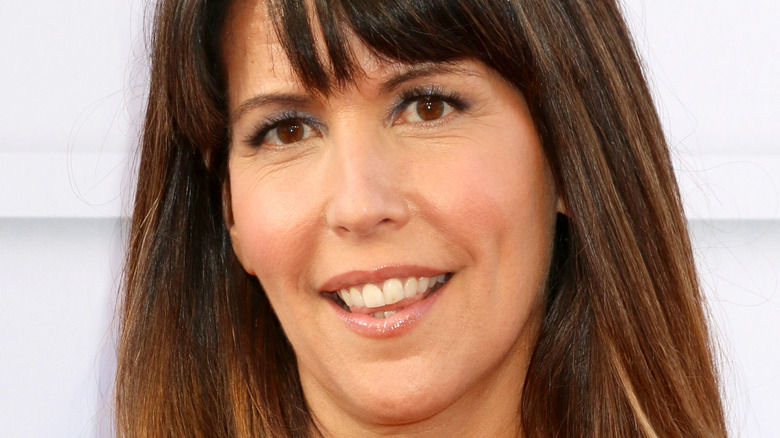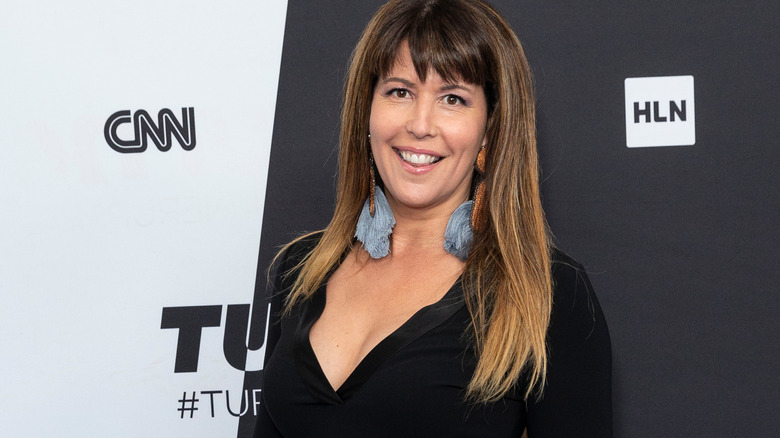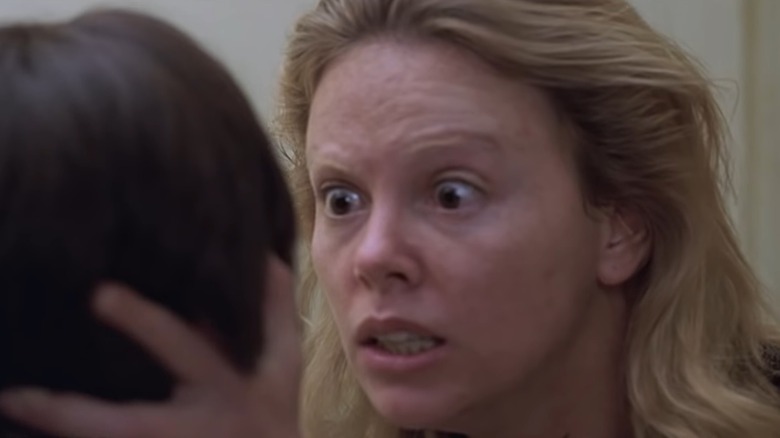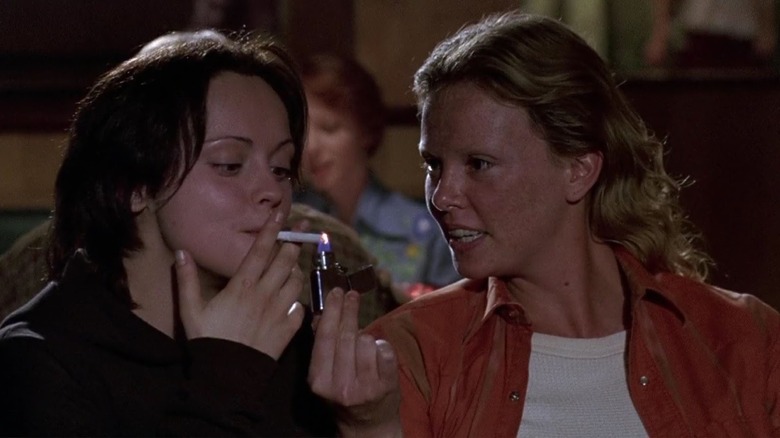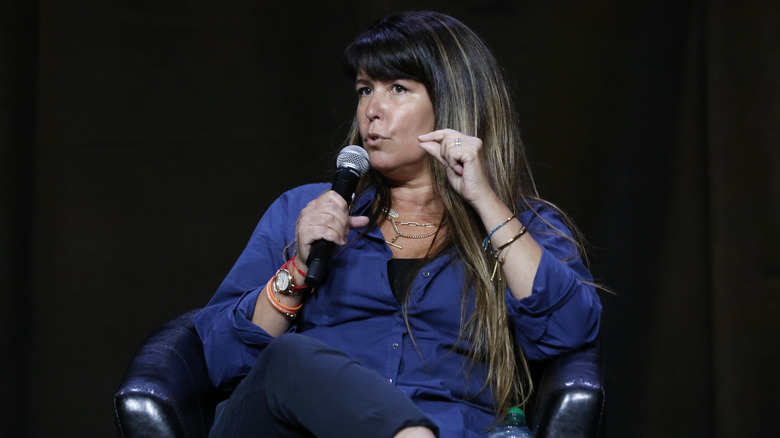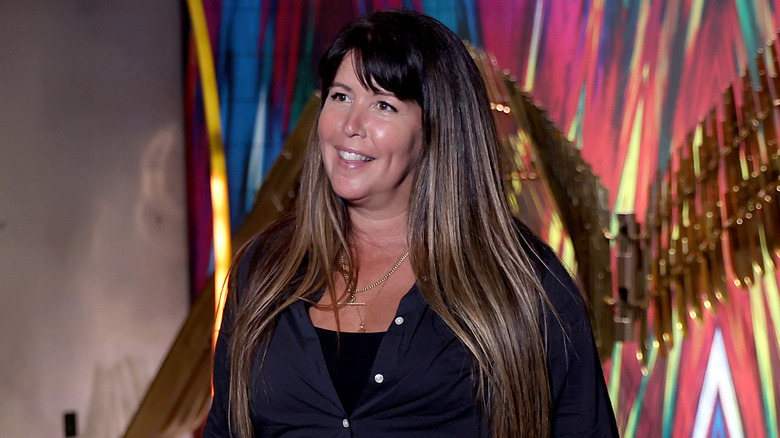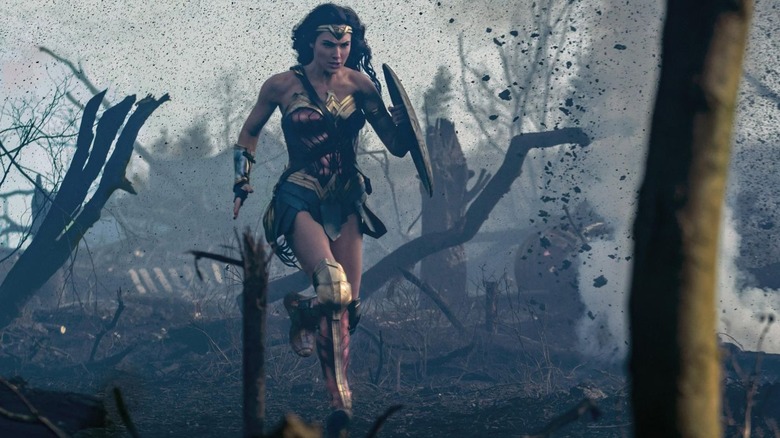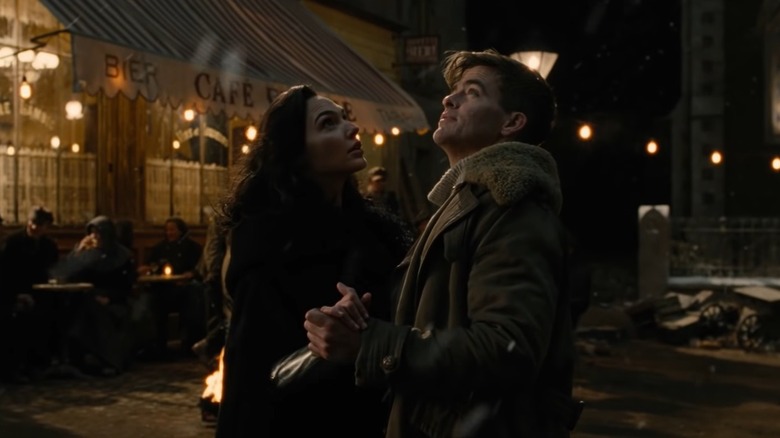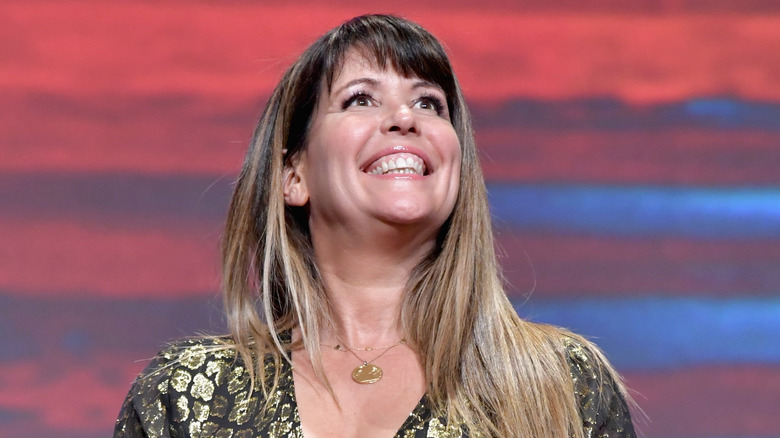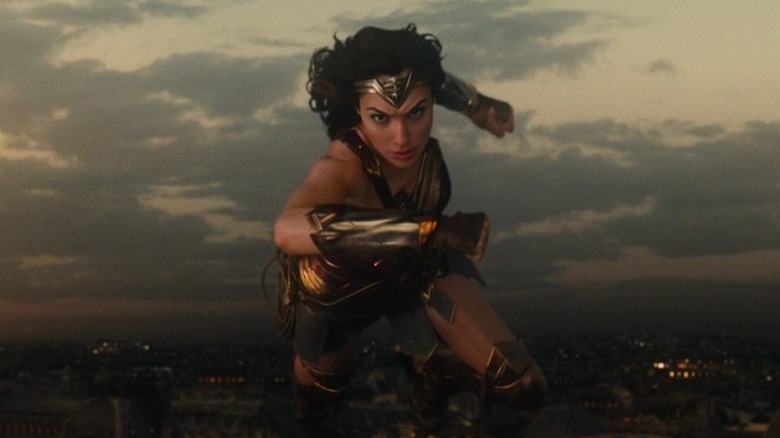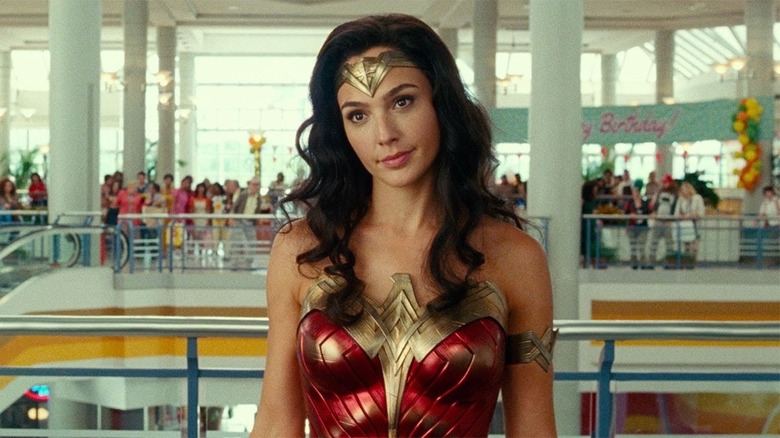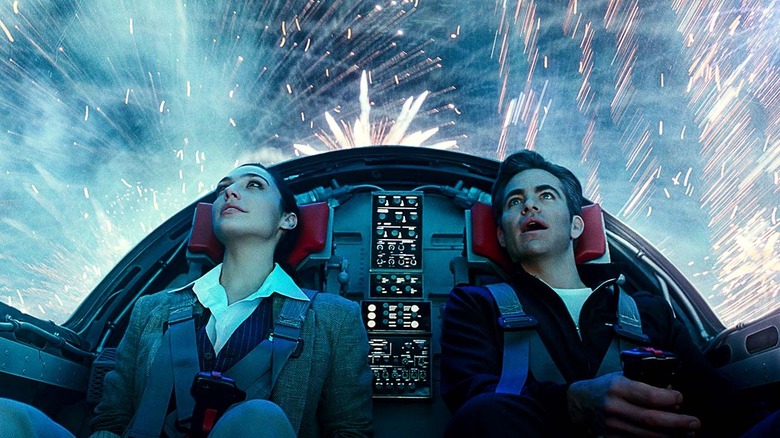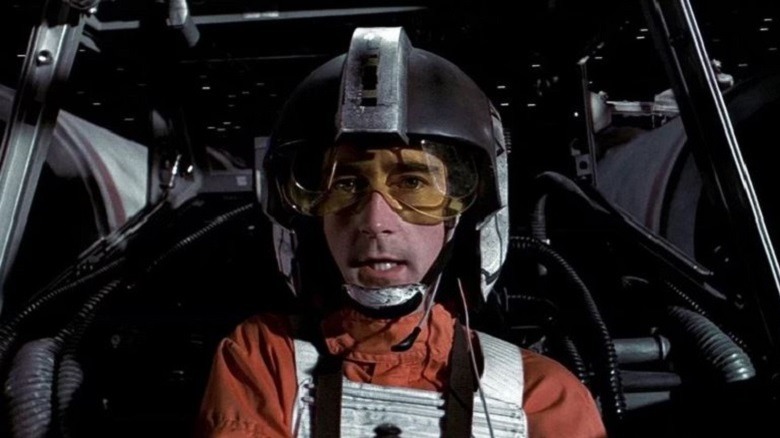The Untold Truth Of Patty Jenkins
In 2017, director Patty Jenkins told The Hollywood Reporter, "I've always been moved by the idea of movies that are personal but still have a huge reach." Understanding the importance of those kinds of stories has been one of the guiding principles of Jenkins' career as a filmmaker — a career that's involved the fantastical adventures of the first two live-action "Wonder Woman" movies, as well as the grisly murders chronicled in the acclaimed drama "Monster."
Plus, Jenkins' career hasn't just been limited to the world of film. She's also directed episodes of television shows ranging from "Arrested Development" to "I Am the Night." And thanks to her wide range of projects, there's probably a whole lot that most movie fans don't know about this celebrated filmmaker. From the directors who inspired her to the struggles she faced while making "Wonder Woman," here is the untold truth of Patty Jenkins.
Where did her love for art come from?
Long before she was a well-known filmmaker, Patty Jenkins was just a kid growing up in a military family, one that was constantly on the move. Even without a permanent home to reside in, though, Jenkins was eventually able to establish something extremely concrete — her love for art and especially her fondness for the world of movies. Of course, she'd have to wait until she went off to the Cooper Union school in New York City before making that life-changing discovery.
"They had a Steenbeck editing bay, and the first generation of video editing [equipment], the Toaster," Jenkins said to the Director's Guild of America in discussing what her first Experimental Film class at this institution was like. "It was the first time I had a completely truthful relationship to art. I wanted to live up to the music that I heard and make incredibly powerful emotional moments. That has continued to this day."
Her passion was also inspired by a love for certain directors like Stanley Kubrick, Elia Kazan, and Martin Scorsese. She particularly took inspiration from the unpredictability of their works and how they reveled in plots that weren't trying to play to the audience's comfort zone. Such features have ended up factoring into some of Jenkins' own projects, such as "Monster" or her episodes of "The Killing."
How Patty Jenkins knew Charlize Theron was perfect for Monster
It's not the only impressive part of "Monster," but there's no denying that Charlize Theron's lead performance in this serial killer drama is what really takes things to a whole new level. Utterly transformative and so massively different from many of her other performances, Theron captivates in her turn as murderer Aileen Wuornos. Though it can be hard to imagine now, there was initially some skepticism on the concept of Theron playing this part, though Patty Jenkins never lost confidence in her casting.
"I had been wracking my brain," Jenkins told Spliced Wire about her prolonged process of finding the perfect person to headline "Monster." "And I was sleeping after trying to write (one night), and I woke up in the middle of the night, and 'The Devil's Advocate' was on. There was this close-up of her face, and I just sat up and thought, 'Oh, yeah! Charlize could do it!' I fell back asleep and wrote it down the next day."
Jenkins went on to note how Theron eventually came around to audition for "Monster" once the script was complete, and "she was unlike all the other girls. She was the least enthusiastic. She was like, 'Why do you want me?'" Theron's initial misgivings over a perception that "Monster" would be exploitative rather than thoughtful melted away once she started talking to Jenkins. This set the stage for "Monster" to score an all-time great lead performance, which also netted Theron an Oscar for Best Actress.
She has some complicated thoughts about Monster
"Monster" is not an easy movie to watch, and that'd be especially true for anyone related to the men that Aileen Wuornos killed. In bringing this movie to life, Jenkins primarily concentrated on making sure the acting, tone, and storytelling details were absolutely perfect. However, she did consider the prospect of whether or not she'd want those aforementioned family members to ever watch "Monster."
"I actually, frankly, hope that they don't see the film, even though there's no way without them seeing it for anybody to understand that I'm not sympathizing with [Wuornos'] actions," Jenkins said to Spliced Wire about the idea of those family members sitting down to watch "Monster." Because Jenkins herself has experienced loss in her life, she observed that she wouldn't want to watch a movie about those traumatic experiences. For the families of those Wuornos murdered, Jenkins imagined they'd have a similar hesitance. "So in a way, I hope those people don't see it because it's not their story," Jenkins continued. "I tried to keep the victims as generic as possible. I've been asked why I didn't show more of the victims or their families. Well, that's not the story I'm telling at all."
Her experience directing television
While Patty Jenkins is most famous for her works in the domain of cinema, she's also directed quite a few installments of episodic television. This had included everything from sitcoms like "Arrested Development" to HBO's "Entourage." Jenkins clearly believes in what television storytelling can accomplish, and she's been open about what her experiences in this field have been like.
"If you love the show and respect the people involved, living up to somebody else's vision is a great learning ground," Jenkins said to the Director's Guild of America on what it was like directing an episode of "Arrested Development" right after helming "Monster." "It was completely fascinating new stuff." Her forays into TV have also included directing the pilot episode for the program "The Killing," which proved "fascinating" in its own unique ways. "I had more time and money on that pilot than ["Monster"]," said Jenkins. "I wanted a lush cinematic look and an emotional feel to juxtapose against the story and expectations of the genre."
Given her positive experiences on these programs, it's no wonder Jenkins has further explored television directing since "The Killing" with programs like "Betrayal" and "I Am the Night," the latter of which reunited her with "Wonder Woman" leading man Chris Pine.
The struggles Patty Jenkins faced after Monster
After delivering Charlize Theron an Oscar win with "Monster," Patty Jenkins was ready for her career to explode. But like many women directors who break through with an acclaimed movie, she found herself struggling to get any further opportunities to direct feature-length productions. This got to be so bad that, for a moment, Jenkins even considered walking away from directing movies entirely.
"I didn't want to cash in, and I don't believe in developing the stuff within the studio system, so I kept writing on spec, and then the movies wouldn't [happen]. ... There was a moment that I was like, 'I give up,'" Jenkins recalled to Empire. Among the high-profile projects that Jenkins was attached to direct that never got off the ground was an early version of "Thor: The Dark World," which Jenkins departed due to her disagreements over the screenplay.
In 2014, Jenkins once again appeared to have finally settled on a post-"Monster" project with an assassin action movie called "Sweetheart," only for the production to never move forward for unknown reasons. Other projects Jenkins tried to make directly after "Monster" included a Chuck Yeager biopic. While Jenkins found more consistent work as a director once "Wonder Woman" hit, the period between "Monster" and that DC Comics film was a stressful one for the filmmaker — full of projects that came so close and yet so far from being fully realized.
Her response to Wonder Woman's success
"Wonder Woman" wasn't just a hit, it totally rewrote box office norms. Its $412 million domestic total surpassed all three preceding DC Extended Universe movies by a massive margin and even put it ahead of — at the time – all non-"Avengers" Marvel Cinematic Universe properties, domestically speaking. Meanwhile, its $800+ million worldwide haul upended long-standing beliefs about how well lady-led blockbusters could do at the global box office while also making "Wonder Woman" the highest-grossing live-action feature directed by a solo woman filmmaker. For director Patty Jenkins, this level of enormous success was, very understandably, a lot to process.
"I didn't really start to make the connection about the lightning rod it was going to hit until it had opened, I assumed that it would be seen just as a superhero film," Jenkins explained to Variety. In particular, Jenkins was taken aback by how she was garnering so much attention for directing the film. Rather than the movie being seen as just another product emanating from DC Films, the likes of Hillary Clinton and Dwayne Johnson were calling Jenkins out by name as a key contributor to the success of "Wonder Woman." In other words, it wasn't just Diana Prince who'd arrived in the pop culture zeitgeist — Patty Jenkins had too.
Her initial struggles with Wonder Woman
Given the extraordinary success Patty Jenkins had in directing "Wonder Woman," it's now hard to imagine anyone responding to her ideas with anything beyond an enthusiastic "yes!" But in recent years, Jenkins hasn't shied away from detailing the kind struggles she faced in presenting her own concepts in the earliest days of working on this Warner Bros. superhero film.
"They wanted to hire me like a beard; they wanted me to walk around on set as a woman, but it was their story and their vision. And my ideas? They didn't even want to read my script," Patty Jenkins recounted on Marc Maron's "WTF" podcast, via The Playlist, regarding an earlier version of "Wonder Woman" that was being proposed long before the 2017 film. "There was such mistrust of a different way of doing things and a different point of view."
The extreme level of nervousness from studio executives over what Jenkins brought to the table frustrated the director, but luckily, this kind of hesitance wouldn't last forever at Warner Bros. Jenkins has made it clear on platforms like Twitter that her experiences with different Warner Bros. executives on the two "Wonder Woman" movies that actually got made were far more positive and supportive. It took a while, but in the end, Jenkins and her "point of view" got the attention they deserved from studio brass.
Why Jenkins wanted to tell Diana Prince's story
Though Patty Jenkins had once briefly been attached to direct the superhero blockbuster "Thor: The Dark World," she was still an unlikely choice to helm the first-ever live-action "Wonder Woman" movie. But while she was an unexpected pick, Jenkins didn't come by this project accidentally. Directing "Wonder Woman" was a passion project for Jenkins and one that intersected with a lot of her own personal interests as an artist.
"I love a great myth. I love a superhero origin story," Jenkins said to Rolling Stone about what specific qualities made her want to pursue a "Wonder Woman" movie. "I had been profoundly touched by 'Superman' when I was a kid; it had this special place in my heart. The idea that you could both make a tentpole movie that's being totally supported [by the studio] but also make something uplifting and magical and personal -– just a single character's arc –- was exciting to me."
Plus, it turned out that Jenkins, like so many people, was a longtime fan of Wonder Woman, and she was astonished that nobody had attempted to do a live-action movie starring one of the most popular superheroes in history. With all this passion for both sincere blockbusters and Wonder Woman as a character, it becomes quite apparent that Jenkins was an ideal choice for Diana Prince's big-screen debut.
What films influenced Wonder Woman?
In bringing "Wonder Woman" to life, Patty Jenkins didn't just look to other installments in the DC Extended Universe for creative inspiration. She also found her vision for this comic book movie stirred up by a string of other productions that influenced various aspects of the project, ranging from the romance between Diana Prince and Steve Trevor to its optimistic attitude.
Speaking at a YouTube Master Class session recounted by Hello Giggles, Jenkins cited everything from the first "Superman" movie to "Raiders of the Lost Ark" to "Casablanca" as key influences on "Wonder Woman." In particular, the latter title provided a helpful template for the film's central relationship. "I was like, I want a great, grand love story about equals dealing with a complicated thing," Jenkins said of "Casablanca."
As for "Raiders," Jenkins looked to that movie as a guide for how to use a period-era setting without getting all mopey. "Indiana Jones became my second [influence] because I was like, 'Okay, cool, what's a great experience that deals with war, but that's a lot of fun? That [features] a great guy, a real earth-bound guy?'" Jenkins explained. She especially used cues from "Raiders" when directing Chris Pine's performance as Steve Trevor. After all, if you're going to model your period-era action hero on somebody, it might as well be an all-time great icon like Indiana Jones.
How Wonder Woman changed Patty Jenkins as a filmmaker
"Wonder Woman" was an influential movie in the world of superhero cinema in a lot of ways, but it also proved impactful on its filmmaker, Patty Jenkins. Her second feature-length directorial effort and a significant step up in scope and profile from her directorial debut, "Monster," it was inevitable that Jenkins would get affected by her experiences helming "Wonder Woman."
"It's interesting to direct something so difficult but also something that you love so much," Jenkins explained to Rolling Stone. "I learned a million little things about execution of this kind of movie and longevity of vision, having to hold the center because really only the director does." In particular, Jenkins mentioned that her filmmaking had to appeal to and satisfy demographics like 13-year-old girls, an audience she wasn't really considering for prior filmmaking efforts like "Monster."
Jenkins also expressed satisfaction with sticking to her guns on delivering an unabashedly hopeful movie, as well her own success in overcoming a learning curve in directing a film with such a massive budget and scope. Such sizeable elements were a significant departure from the microbudget filmmaking of "Monster." "Wonder Woman" wasn't the first time Jenkins directed a movie, but through helming this feature, it did prove to be a first for her in ways that have left a lasting impact on her as a filmmaker.
Figuring out the invisible jet
In "Wonder Woman 1984," Diana Prince and Steve Trevor have to make a speedy getaway, one that involves the superhero's iconic invisible jet. Given that this see-through plane is one of Wonder Woman's most famous crime-fighting tools, you might imagine it would be a cinch to figure out how to incorporate it into a live-action movie. But Patty Jenkins has been upfront that figuring out how to work it into the movie took quite a long time.
"That was something that I was dead set on. ... The invisible jet was the absolute hardest thing to figure out how to make it cool because of everything you'd ever seen of her sitting in the seat," Jenkins said to Collider about this process. "I was like, 'I'm going to figure this out one of these days, how to make this invisible jet.'"
So when did it all come together? Well, as Jenkins has explained, she was sitting with screenwriter Geoff Johns, and they were discussing the scene where our heroes make their way to Egypt. And that's when everything clicked. As Jenkins put it, "I was so psyched and I worked so hard on like, it made sense, that if her father hid Themyscira, then they figured out how to make the wall. And so it was such a cool thing to figure out."
The rich history Patty Jenkins is drawing on for Rogue Squadron
After having conquered the world of superhero movies with her two "Wonder Woman" features, Patty Jenkins has set her sights on a new area of blockbuster filmmaking: the world of "Star Wars." Jenkins will dip her toes into these waters with "Rogue Squadron," the first feature film entry in the franchise after "The Rise of Skywalker." As the title would indicate, this feature will be utilizing a name incredibly familiar to fans of classic "Star Wars" games and Expanded Universe media. However, Jenkins doesn't intend to make just a straightforward adaptation of all too familiar material when it comes to her "Rogue Squadron" movie.
"The Michael Stackpole books and the video games and all of the 'Rogue Squadron' books, there's an incredible history that's really important to honor," Jenkins explained to the Associated Press regarding her creative influences on "Rogue Squadron." "And yet, it must be brought to a new age because we have to tell a new story with it, and so you're trying to blend the best of everything and make it the great fighter pilot movie, which I've always wanted to make, as well." Of course, even with all these ambitions, Jenkins has still expressed a desire to deliver a narrative that all audiences, no matter their connection to "Star Wars," can be enthralled by.
